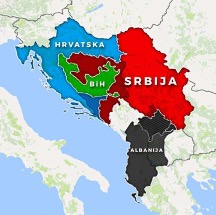Anyone who glances at a European Union map will immediately notice the conspicuous exclusion of most of the Western Balkan states. Despite being surrounded by EU members on all sides, the countries of this region (apart from Croatia) have so far failed to successfully attain membership in the bloc. There are many reasons for this, including both the region’s ongoing struggle to develop democratic institutions, as well as the European Union’s own “enlargement fatigue.” The continued existence of ethnic heterogeneity in Western Balkans, however, is not to blame. In fact, any consideration of border changes as a solution to the region’s stagnant EU path suggests a betrayal of the very values that lie at the heart of the European Union.
Worryingly, not all seem to realize this. On April 15, Ljubljana-based outlet Necenzurirano published a written proposal for wide-ranging border changes in the Western Balkans that had been delivered to Charles Michel, the President of the European Council. While no country has claimed authorship of this unofficial diplomatic document, or ‘non-paper’ in Brussels-speak, many suspect that it came from Slovenian Prime Minister Janez Janša or a high-level official in his government. The non-paper suggests that the European Union throw its support behind a variety of measures designed to create ethnically homogeneous states in the region, including the unification of Albania and Kosovo as well as the cession of Bosnia-Herzegovina’s primarily Serb and Croat areas to Serbia and Croatia proper.

This is far from the first proposal to redraw Western Balkan borders along ethnic lines.
While the violent dissolution of Yugoslavia during the 1990s sprang from ethnonationalist impulses, the geopolitical patchwork that emerged in its wake does not correspond entirely with the distribution of the region’s various ethnic groups. Western Balkan politicians have therefore periodically advocated for further territorial changes in attempts to realize misguided dreams of ethnically pure nation-states.
The European Union’s persistent opposition to border changes and leveraging of the carrot of EU membership have been key to preventing them thus far. In 2011, for instance, German Chancellor Angela Merkel demanded that Serbia give up its claims to northern Kosovo if it wished to join the bloc. This ultimately led to an EU-brokered deal in 2013, whereby Belgrade agreed to recognize Pristina’s sovereignty over the territory in exchange for the opening of accession negotiations. So long as countries in the region believe that their eventual path to the European Union hinges on respect for the territorial status quo, Brussels maintains the final say on this crucial issue.
Unfortunately, however, it is unclear how committed the European Union remains to this former red line. After the non-paper first surfaced, Michel’s office failed to immediately condemn its contents. In fact, there was no official EU response to the proposals until the Commission finally came out in opposition more than ten days later. This delay, as well as the proposal’s likely origin from a member state government, suggests significant internal EU disagreement about how to approach Western Balkan territorial issues.
It is not just the European Council that has demonstrated the Union’s softening stance on border changes. When the idea of a Serbia-Kosovo land swap resurfaced again in early 2020, top EU diplomat Josep Borrell refused to publicly state his opposition. Overall, Brussels seems increasingly hesitant to reject the toxic goal of ethnically homogeneous states in the Western Balkans. This trend likely stems from frustration with a perceived lack of progress in the region’s reform agenda in recent years, which has prompted a greater willingness to consider bold, alternative ‘solutions’ (as the non-paper states).
Yet opposition to this ideology should be a no-brainer for a bloc that ostensibly champions liberal values such as diversity and respect for minorities. Indeed, the foundational logic of the European Union as a political project rests on a repudiation of ethnic nationalism and its associated perils. Allowing territorial changes motivated by this outlook in future member states, therefore, represents a betrayal of the European Union’s very raison d’être. Furthermore, changes such as those proposed in the non-paper would lead to a host of dangerous consequences, including the legitimation of Russia’s claims to various territories in its near abroad as well as increased risks for the hundreds of thousands of people who would end up on the “wrong” side of these new ethnically determined borders.
A much more productive course of action would be for the European Union to get serious about promoting reform in the Western Balkan states. The COVID-19 pandemic has worsened the already precarious condition of democracy and rule of law across the region, casting serious doubt on its countries’ ability to fulfill the political criteria for EU accession in the foreseeable future. Despite its clear geopolitical interest in integrating the Western Balkans as soon as possible, EU engagement in the region has been lacking.
To support societal resilience, Brussels should provide aid to selected independent media outlets and civil society organizations in Western Balkan countries. It should also enthusiastically support the extension of the existing ‘mini-Shengen’ area between Serbia, Albania, North Macedonia, and Kosovo, to include Montenegro and Bosnia-Herzegovina as well – this would provide an ideal avenue for enhanced regional cooperation and trust. Finally, the European Union should offer single market access to any country in the region that desires it, providing an achievable interim goal that will encourage Western Balkan governments to continue making the necessary reforms for full EU membership down the line.
Ultimately, the Western Balkans must move beyond the ethnonationalist tensions that have brought the region so much pain in recent decades. While changing borders may seem like an easy fix, it legitimizes the existence of a pernicious ideology while failing to address the root of the problem. A better way forward is to do the hard work of building better societal relations within the region’s states as currently constructed. This is true not only for the Western Balkan countries themselves but for the European Union as well – indeed, if it ever wishes to welcome the region into the fold without losing itself in the process, there is no other option.
About the Author
Nick Lokker
Nick Lokker is the YPFP 2021 Europe Fellow. He has professional experience in positions at the Center for European Policy Analysis (CEPA), the European Parliament, and the American Institute for Contemporary German Studies. He is a graduate student at Georgetown University's Walsh School of Foreign Service, where he focuses on transatlantic security cooperation, EU-Russia relations, and EU enlargement.



